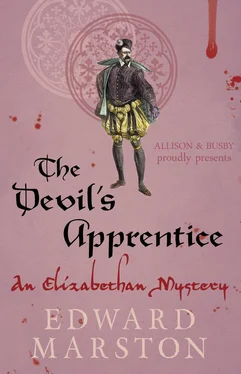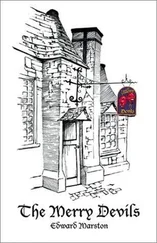Edward Marston - The Devil's Apprentice
Здесь есть возможность читать онлайн «Edward Marston - The Devil's Apprentice» весь текст электронной книги совершенно бесплатно (целиком полную версию без сокращений). В некоторых случаях можно слушать аудио, скачать через торрент в формате fb2 и присутствует краткое содержание. Год выпуска: 2014, ISBN: 2014, Издательство: Allison & Busby, Жанр: Исторический детектив, на английском языке. Описание произведения, (предисловие) а так же отзывы посетителей доступны на портале библиотеки ЛибКат.
- Название:The Devil's Apprentice
- Автор:
- Издательство:Allison & Busby
- Жанр:
- Год:2014
- ISBN:9780749015169
- Рейтинг книги:4 / 5. Голосов: 1
-
Избранное:Добавить в избранное
- Отзывы:
-
Ваша оценка:
- 80
- 1
- 2
- 3
- 4
- 5
The Devil's Apprentice: краткое содержание, описание и аннотация
Предлагаем к чтению аннотацию, описание, краткое содержание или предисловие (зависит от того, что написал сам автор книги «The Devil's Apprentice»). Если вы не нашли необходимую информацию о книге — напишите в комментариях, мы постараемся отыскать её.
The Devil's Apprentice — читать онлайн бесплатно полную книгу (весь текст) целиком
Ниже представлен текст книги, разбитый по страницам. Система сохранения места последней прочитанной страницы, позволяет с удобством читать онлайн бесплатно книгу «The Devil's Apprentice», без необходимости каждый раз заново искать на чём Вы остановились. Поставьте закладку, и сможете в любой момент перейти на страницу, на которой закончили чтение.
Интервал:
Закладка:
The pig was housed in a makeshift sty that seemed hardly solid enough to contain such a large animal. Leaning over the fence, she poured the contents of the pail into the rudimentary trough. Snout deep in the food, Beelzebub began to eat it, emitting an array of slurping sounds that were punctuated by grunts of satisfaction. Mother Pigbone leant over to pat the bristled head of the huge black boar. She was so busy talking to him that she did not hear the approach of a rider.
‘Mother Pigbone?’ asked a voice.
She turned to look up at the man in the saddle. ‘Yes, sir?’
‘I believe that you can help me.’
The performance that afternoon was extremely competent rather than inspiring. It held the audience throughout but it fell short of the high standards usually attained at the Queen’s Head. Lawrence Firethorn played the title role in The Insatiate Duke with the blend of physical energy and emotional power that were synonymous with his name but few members of the cast were able to hold their own against him. As the wise Cardinal Boccherini, Edmund Hoode was less impressive than he normally was in a part he had helped to shape to his own talents. The play itself was written by Lucius Kindell, a young author who had needed Hoode’s guiding hand to complete his drama. It featured Cosimo, Duke of Parma, a man of such insatiable desires that he took his pleasures ruthlessly wherever he chose. When Cosimo turned his lecherous gaze upon the beautiful Emilia, the Cardinal did everything he could to persuade him to spare the girl but the Duke would not listen. Rather than submit to his demands, Emilia, as played with affecting pathos by Richard Honeydew, took a fatal dose of poison. After her death, Cosimo learnt that she was, in fact, the child he had fathered on a woman at the Milanese court. The Duke had, in effect, killed his own daughter and bitter recrimination followed.
Barnaby Gill provided the comic relief in a heavy tragedy and made the Great Hall resound with laughter. It was the relationship between Duke Cosimo and Emilia that really fascinated the spectators, however, and made them shudder with horror or sigh with regret. Edmund Hoode, in the robes of a Roman Catholic cardinal, managed to win over a Protestant audience with his innate decency. Westfield’s Men used the available space to dramatic effect. At the suggestion of Nicholas Bracewell, some of the more intimate scenes were played in the minstrels’ gallery and he devised a spectacular death for the Milanese ambassador, a role taken by Owen Elias. Stabbed in a fit of anger by the Duke, he fell backwards over the balcony and dropped into the waiting arms of four actors carefully stationed below. It was a breathtaking moment and drew a full minute of applause. Elias was back on stage within minutes as a Venetian spy.
The problems did not begin until Act Four. It was then that Davy Stratton had two separate entrances. The apprentice was a servant without a single line to speak but he nevertheless made an impact. In a scene where he was required simply to hand a silver chalice of wine to the Duke, he managed to drop it and provoke unintended laughter. Nicholas put it down to nervousness but Firethorn took a harsher view. Storming off at the end of a scene, he hissed in the book holder’s ear.
‘If Davy does that again, I’ll strangle him!’
‘It was an accident,’ said Nicholas.
‘He did it deliberately.’
‘Davy apologised as soon as he came offstage.’
‘What use is an apology when he’s already ruined a scene?’
‘It won’t happen again.’
‘It had better not, Nick.’
Before he could chastise the boy, Firethorn had to surge back on stage. He imposed his control over the audience once again and kept it throughout the remainder of the act until Davy entered once more. All that the boy had to do was to hand him a scroll so that the Duke could unfurl it and read it. Davy trotted in, bowed obsequiously to his master, and took something from his belt. Instead of giving Firethorn a letter, however, he handed him a large carrot. Pretending that it was an error, he swiftly retrieved it and gave him the scroll instead but the damage had already been done. More laughter burst out. Davy saw the murderous look in Firethorn’s eye and fled the stage, bumping into George Dart, who was entering with a tray of food, and hitting him to the floor. There was another eruption of mirth. The dramatic tension patiently built up in the scene was completely vitiated.
When the boy finally came offstage, Nicholas grabbed him by the neck.
‘What do you think you’re playing at?’ he said angrily.
‘I’m sorry,’ whimpered the boy.
‘That was no accident. You’re doing this on purpose.’
‘No, I’m not.’
‘Don’t lie to me, Davy,’ said Nicholas before signalling Cardinal Boccherini back on stage. ‘What you did was unforgivable. You’ll not go out there again.’
‘But I’ve three entrances to make in Act Five,’ said Davy.
‘Your contribution to The Insatiate Duke has finished, lad. Go back to the cottage and wait there till we come. I’ll make sure that nobody comes near you until Master Firethorn has had a stern word with you.’
The boy ran out sobbing but Nicholas had no sympathy for him. Instead of a compliant servant, they had a rebel on stage and there was no place for him in a tragedy that had to be played with high seriousness. The unscheduled humour that Davy had injected into the play left Firethorn in a towering rage but he exploited it well, working himself up into such a fury in the final scene that the audience was genuinely frightened of him. He then broke down in tears with such moving sincerity over the corpse of his daughter that they forgot his long sequence of evil deeds and actually shared his pain. The insatiate Duke appeared a sad, lonely, suffering, tragic figure. At the supreme moment in the play, however, Firethorn was once again thwarted but it was not by an apprentice this time.
When he delivered his last line, he plunged a dagger into his own heart then collapsed across the body of his daughter. A profound silence should have ensued, during which both corpses were carried away with regal dignity. Even at the Queen’s Head, notorious for the turbulence of its spectators, everyone was struck dumb with pity at the sight. The shocked silence was not maintained at Silvermere. No sooner had the two bodies been hoisted on to the shoulders of those about to bear them off than a woman’s cry rang out with awful clarity. The husband seated beside her had collapsed in a heap on the floor. Consternation spread throughout the entire hall. Seething with anger, the dead Cosimo came back to life to open a jaundiced eye in order to survey the unhappy scene. Dozens of people had leapt to their feet and a loud murmur grew in volume. In one second, an anonymous member of the audience had eclipsed two hours’ dramatic expertise from Westfield’s Men.
Lowered to the ground in the tiring-house, Firethorn was fuming. Such was the commotion in the hall that he did not know whether to lead out his company to take a bow or remain sulkily out of sight.
‘O injurious world!’ he yelled. ‘It’ll drive me mad, Nick!’
‘Someone has been taken ill,’ said Nicholas.
‘Yes, his name is Lawrence Firethorn. I have the sweating sickness.’
‘Will you not take your bow?’
‘Would anyone notice if we did?’
‘Sir Michael will expect it.’
‘Then he shouldn’t have arranged for one of his guests to fall off his chair at the very moment when I was being borne off to the mortuary.’
‘There!’ said Nicholas as desultory applause filtered through from the hall. ‘They want to acclaim you. Take your due.’
‘Follow me, lads,’ ordered Firethorn, looking around the room. ‘Let’s see if we can milk something from them at least.’
Читать дальшеИнтервал:
Закладка:
Похожие книги на «The Devil's Apprentice»
Представляем Вашему вниманию похожие книги на «The Devil's Apprentice» списком для выбора. Мы отобрали схожую по названию и смыслу литературу в надежде предоставить читателям больше вариантов отыскать новые, интересные, ещё непрочитанные произведения.
Обсуждение, отзывы о книге «The Devil's Apprentice» и просто собственные мнения читателей. Оставьте ваши комментарии, напишите, что Вы думаете о произведении, его смысле или главных героях. Укажите что конкретно понравилось, а что нет, и почему Вы так считаете.












